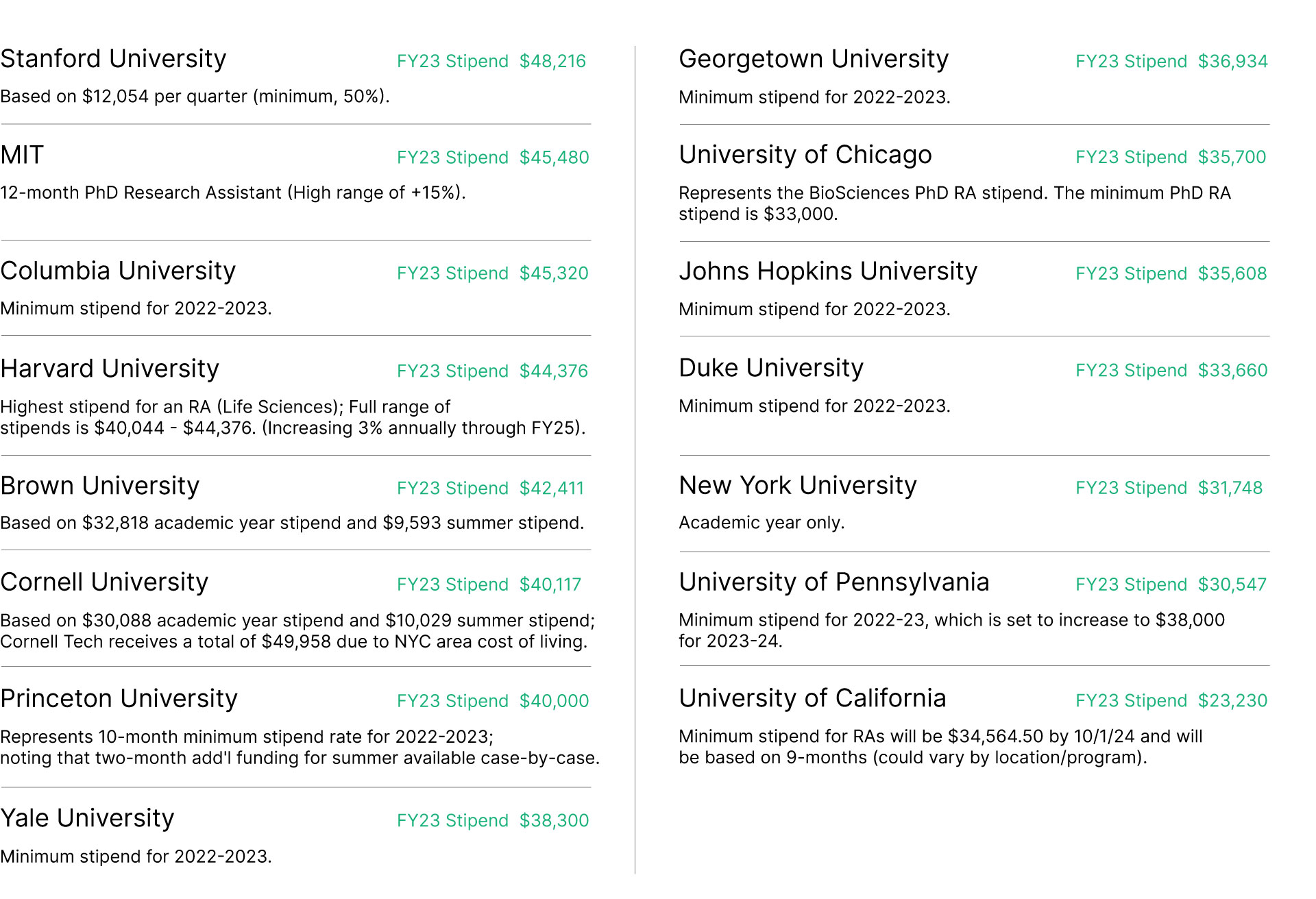March 22 bargaining update
March 22, 2023
MIT’s bargaining team met with the GSU’s bargaining team for a 16th time on Wednesday, March 22.
The parties continue to make progress on the few remaining non-economic issues, including nearing an agreement on a workload provision. MIT continues to carefully evaluate how best to improve review procedures for discrimination and harassment complaints, and the parties had a productive exchange on this topic during the bargaining session.
The parties also agreed to schedule another bargaining session on Thursday, May 4, in addition to previously scheduled sessions throughout the end of March and April. The GSU stated they would like to agree to a contract by the week of May 8 so that negotiations conclude before the end of the academic year. The MIT administration shares this goal.
Overview of MIT’s Response to the GSU’s Economic Proposals
After a careful review and thorough analysis of the 33 economic proposals the GSU presented on February 27, MIT developed a thoughtful response. While we recognize we are in the early stages of negotiating over the economic provisions, the GSU proposed an unrealistic 31-41% increase to our very competitive salary levels, which would create inequities with many others in our community given the constraints on MIT’s finances. In total, the GSU’s economic proposals would require approximately $150 million in new annual funds – most of which would require support from the central budget – which far exceeds the average annual 3.5% growth in MIT’s unrestricted central revenues experienced over the last ten completed fiscal years. These funds also provide for annual salary increases for all other employees at MIT, growth in undergraduate financial aid due to growing income inequality each year, and increased costs due to inflation.
We proposed raising bargaining unit members’ already competitive salaries by 4% in the first year of a new contract. This is an equitable, responsible, and sustainable offer. Under the Institute’s proposal, salaries would increase by 3.5% and 3% in years two and three of the collective bargaining agreement, respectively.
In addition to these salary increases, MIT also proposed two new programs for international students and high-need students with dependent children, as well as an expanded vacation benefit.
Salary Increases
Combined with the nearly 9% pay increase MIT provided graduate students last fiscal year, the 4% first-year increase is a generous offer. MIT’s minimum doctoral graduate stipends/salaries already rank second highest in the nation (see below chart), behind only Stanford, where the costs of living are higher than in Boston/Cambridge. In fact, since many departments, labs, and centers pay above the Institute’s minimum stipend/salary level, almost half of MIT RAs and TAs are paid more than the minimum.
MIT’s offer also maintains a healthy buffer of more than 10% between our stipends/salaries and the expenses doctoral students themselves have reported to us in MIT’s Cost of Living Survey, even while accounting for inflation.
It is also worth noting that the increase MIT is offering in year one of the contract would bring the average total annual compensation of a doctoral RA/TA, including the value of tuition and benefits, to approximately $130,000.
New Financial Programs for International Students and Graduate Students with Children
In making this offer of benefits, MIT prioritized students with the highest need in its response to the union’s economic proposals, introducing two new programs: one-time payments of $1,000 for all international graduate students to assist with additional fees and expenses associated with their visa status, and needs-based annual grants of up to $10,000 for graduate students with dependent children. These grants would be above and beyond the need-blind grants of $6,500-$8,500 MIT currently makes available to graduate students with dependent children.
The Institute made these proposals in keeping with its commitment to provide students facing the most significant financial challenges with additional support.
Expanded Vacation Benefit
MIT offered to add five days to its annual 10 vacation-day policy. These additional days can be used flexibly, and address the many other miscellaneous leave requests the GSU has proposed.
Upholding our Commitment to Making Fair and Fiscally Sound Decisions for Everyone at MIT
The GSU’s position goes directly against one of the core principles guiding MIT in these negotiations. We are committed to making fair and fiscally sound decisions that put the best interests of all community members – today’s students, staff, faculty, and researchers as well as tomorrow’s – first.
Beyond the 3,600 members of the GSU, MIT must also provide pay increases this year for 1,500 graduate student fellows, as well as 16,000 other employees. And the Institute must meet other critical needs, such as increasing financial aid for undergraduate students and their families. We need to fund equitable pay increases for all MIT community members, and make financial aid enhancements, to address the inflationary pressures facing everyone who the Institute must consider when making budget decisions.
Because MIT has limited financial flexibility due to donor restrictions on endowed resources and limits on research-based revenue, the choices MIT makes at the bargaining table could lead to significant trade-offs that would impact our entire community and research competitiveness. Therefore, the agreement we ultimately reach with the GSU must prioritize fairness and equity. And it must advance the Institute’s mission rather than limit it.
Continuing to Negotiate in Good Faith
We deeply value our graduate students — as reflected in the already competitive salaries we provide — and we share many of the GSU’s goals. At the same time, we have a responsibility to reach an agreement that is fair for everyone at MIT, today and in the future.
We look forward to our continued work with the GSU to find common ground on these important issues.
Peer Comparisons
Based on 12-Month Research Assistant Appointment Stipend where available
